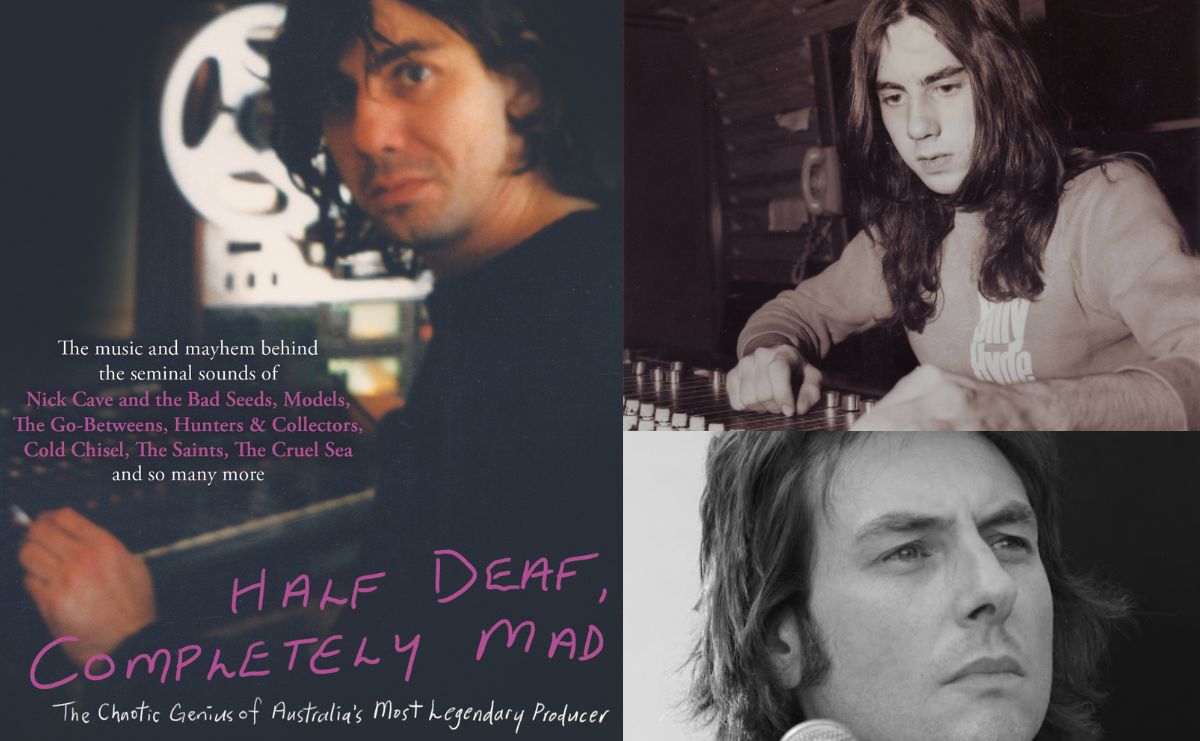Half Deaf, Completely Mad is the story of both destructive genius and its brilliant accompanying soundtrack.
Tony Cohen’s producer/engineer credits are associated with a roll call of outsized legends: from Hunter and Collectors to Cold Chisel, Nick Cave and the Bad Seeds, and The Cruel Sea, his imprint is stamped on a generation of Australian independent music from the 70s, 80s and 90s.
Despite that, in contrast with many rock histories, Half Deaf, Completely Mad avoids hubris (beyond its front cover subtitle, which includes the words ‘Australia’s most legendary producer’) whether in reference to the iconic albums or the bacchanalian lifestyle of its protagonist.
As a result, it attains poignancy – a self-effacing portrait of a figure intensely driven by the moment, drugs and the music, still manifest in often spectacular recordings that are left to do most of the talking.
Written in collaboration with John Olson – and now released posthumously after Cohen’s death in 2017 – it originated as a memoir begun in 2012, and retains Cohen’s voice throughout while incorporating interviews and various bits of biography.
The result carries a distinct vibe of a first-person account transcribed from interviews recorded over a couple of drinks, the speaker warmly offhand and blithely confessional.
In raconteur style, it doesn’t get too bogged down in details or personal psychology, nor does it make any pretence at drawing out deeper meaning or coherence – artistic or otherwise – beyond the vicissitudes of opportunity and the perceptiveness of gut level instinct.
‘Happy accidents, I’d call them,’ he says, of a technical mistake on The Birthday Party’s Prayers on Fire album that sounds unexpectedly great – and is therefore kept. ‘Luck. They’re not details everyone would notice, but we did.’
At the behest of fortune (both good and bad), he turns up on an incredible list of pop cultural Australiana – even including extra work on Mad Max Beyond Thunderdome.
As a studio operator, he often portrays himself as a facilitator rather than instigator. ‘I love it when artists come to you with a clear vision of how their music should sound,’ he says. ‘It saves me from having to think of something.’
Elsewhere, he says, ‘I was just trying to make things sound good.’
Drugs, of course, figure prominently (he admits wryly, ‘I shouldn’t harp on about it’) – and there are periodic frank, shorthand descriptions of the symbiosis of creativity and stimulants. ‘Drugs play a big part in the music,’ he says, of punk rock generally and recording The Birthday Party’s Junkyard specifically. ‘We hit the edge, and made it as far you could go and still live.’
Otherwise, there’s a sad sense of the perfunctory and inevitable to understated descriptions of addiction and relapse. On the same page he’s offered a gig producing The Go-Betweens’ first album, a girlfriend busts up with him for injecting amphetamines, marking ‘the beginning of a desperate period for me’.
‘I moved out of my flat and my drug dealer moved in, that bastard followed me everywhere.’
And while we may want more detail about these drives, and their impact on the music – it’s the latter that will always remain Cohen’s definitive statement, the gigantically rich significance of his life. The book has to be read that way – and it’s wisely studded with prompts (‘LISTEN’, the book commands) to select recordings.
These wonderful sounds inform the experience of Half Deaf, Completely Mad with the sense of a musical galaxy far beyond the mundane environs of the claustrophobic recording studios described in the text.
In doing so, the book properly makes sense as a complete artefact, poignantly contrasting between an impulsive, peripatetic life – lived sometimes at the beck and call of drugs, the maverick genius of others (the influence of Cave, in particular, looms throughout) or authority – and, on the other hand, great succinct artistic statements that remain fixed in time.
Moreover, this space between the memories and the music speaks to an unwillingness, or perhaps inability, to reflect too much – and methodologies resisting the overly-intellectual (which is, after all, typically anathema to good rock ‘n’ roll).
Cohen’s early death at the age of 60 in 2017 brings obvious added poignancy in this context, particularly in the latter stages of the book when his ramshackle personal habits finally catch up with his health – forcing him into a reclusive state, the threat of obsolescence that he recognises.
Read: Book review: Sad Girl Novel, Pip Finkemeyer
But the music lives on without him – and considering its profound link to a soundtrack, any review of Half Deaf, Completely Mad has to say it’s a great book, as long as the albums of Tony Cohen are playing simultaneously, and loudly.
Half Deaf, Completely Mad: The Chaotic Genius of Australia’s Most Legendary Producer by Tony Cohen and John Olson
Publisher: Black Inc
ISBN: 9781760644536
Format: Paperback
Pages: 240pp
RRP: $32.99
Release Date: 30 May 2023





